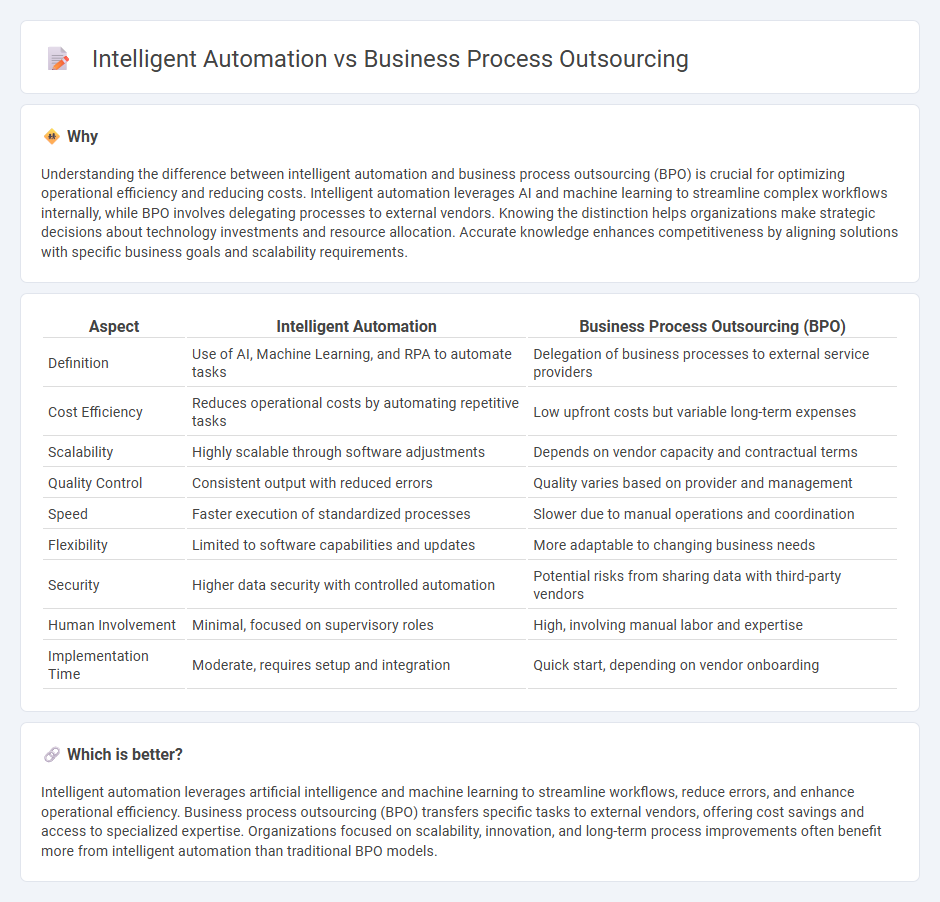
Intelligent automation leverages advanced technologies like artificial intelligence and robotic process automation to optimize workflows, reduce errors, and enhance operational efficiency. Business process outsourcing (BPO) involves delegating specific business functions to third-party service providers to achieve cost savings and access specialized expertise. Discover how intelligent automation and BPO can transform your management strategies for improved performance.
Why it is important
Understanding the difference between intelligent automation and business process outsourcing (BPO) is crucial for optimizing operational efficiency and reducing costs. Intelligent automation leverages AI and machine learning to streamline complex workflows internally, while BPO involves delegating processes to external vendors. Knowing the distinction helps organizations make strategic decisions about technology investments and resource allocation. Accurate knowledge enhances competitiveness by aligning solutions with specific business goals and scalability requirements.
Comparison Table
| Aspect | Intelligent Automation | Business Process Outsourcing (BPO) |
|---|---|---|
| Definition | Use of AI, Machine Learning, and RPA to automate tasks | Delegation of business processes to external service providers |
| Cost Efficiency | Reduces operational costs by automating repetitive tasks | Low upfront costs but variable long-term expenses |
| Scalability | Highly scalable through software adjustments | Depends on vendor capacity and contractual terms |
| Quality Control | Consistent output with reduced errors | Quality varies based on provider and management |
| Speed | Faster execution of standardized processes | Slower due to manual operations and coordination |
| Flexibility | Limited to software capabilities and updates | More adaptable to changing business needs |
| Security | Higher data security with controlled automation | Potential risks from sharing data with third-party vendors |
| Human Involvement | Minimal, focused on supervisory roles | High, involving manual labor and expertise |
| Implementation Time | Moderate, requires setup and integration | Quick start, depending on vendor onboarding |
Which is better?
Intelligent automation leverages artificial intelligence and machine learning to streamline workflows, reduce errors, and enhance operational efficiency. Business process outsourcing (BPO) transfers specific tasks to external vendors, offering cost savings and access to specialized expertise. Organizations focused on scalability, innovation, and long-term process improvements often benefit more from intelligent automation than traditional BPO models.
Connection
Intelligent automation enhances business process outsourcing (BPO) by streamlining repetitive tasks through AI-driven technologies, resulting in increased efficiency and reduced operational costs. BPO leverages intelligent automation to optimize workflows, improve accuracy, and enable real-time data analytics for informed decision-making. Integrating automation within BPO services transforms traditional outsourcing models into scalable, agile solutions that drive innovation and competitive advantage.
Key Terms
Cost Efficiency
Business process outsourcing (BPO) reduces operational costs by leveraging third-party providers to handle non-core functions, often in lower-wage regions, achieving significant labor cost savings. Intelligent automation integrates AI-powered tools and robotic process automation (RPA) to streamline workflows, minimize errors, and cut down processing time, resulting in lower overhead and improved profitability. Explore how combining BPO with intelligent automation can maximize cost efficiency and drive business growth.
Workflow Optimization
Business process outsourcing (BPO) leverages external expertise to manage complex workflows, reducing operational costs and enhancing scalability. Intelligent automation integrates AI-driven technologies such as robotic process automation (RPA) to optimize workflows by increasing accuracy and accelerating task completion. Explore the strategic advantages of combining BPO with intelligent automation to transform workflow efficiency and business outcomes.
Scalability
Business process outsourcing (BPO) offers scalability through flexible workforce management and access to specialized talent, enabling businesses to rapidly adjust operations based on demand fluctuations. Intelligent automation enhances scalability by leveraging machine learning and robotic process automation (RPA) to process large volumes of data efficiently while reducing error rates and operational costs. Explore how integrating these approaches can optimize scalability and drive sustainable growth.
Source and External Links
Business Process Outsourcing | Kelly Services United States - Business process outsourcing (BPO) involves contracting out functions like project management, contact centers, and administrative solutions to increase productivity and decrease operational costs across industries such as semiconductor, life sciences, and financial services.
Business process outsourcing (BPO) | Cognizant - BPO is the transfer of responsibility for specific workflows or processes to a service provider, typically involving assessment, contracting, transition, transformation, and ongoing governance phases to modernize operations with digital technologies and optimize performance.
Business Process Outsourcing (BPO) - Overview, Benefits, ... | Corporate Finance Institute - BPO is outsourcing business functions to third-party providers, who handle related operations; this practice has expanded beyond manufacturing to include numerous functions such as payroll, and requires change management due to its impact on employees and workflows.
 dowidth.com
dowidth.com